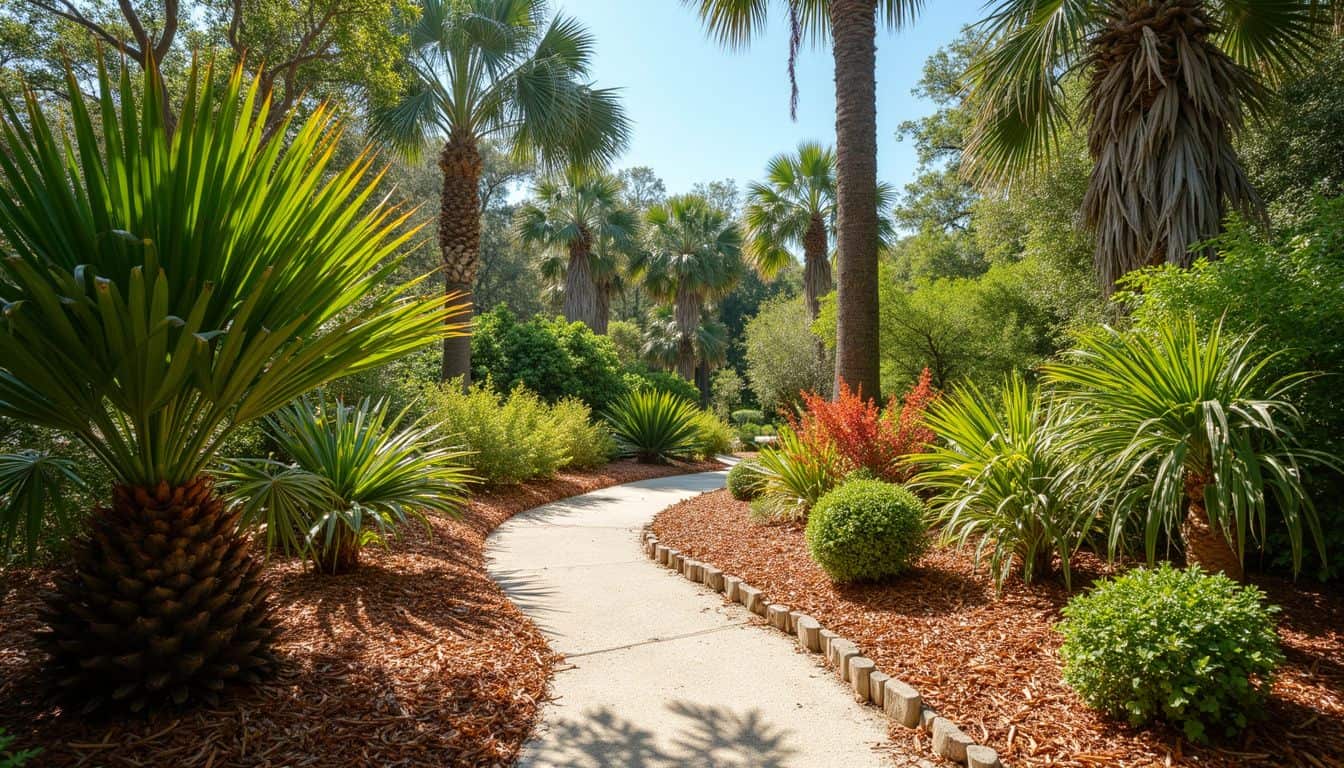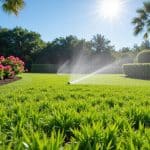
Managing HOA landscaping in Delray Beach brings unique challenges for property managers and business owners. Many struggle with Florida’s harsh climate, strict regulations, and the need to maintain curb appeal while staying within budget.
The mix of salt air, intense sun, and seasonal storms creates extra work for landscape maintenance teams.
Florida Friendly Landscaping programs have shown that proper planning can cut water usage by 50% while keeping properties beautiful. Our essential guidelines for HOA landscaping best practices in Delray Beach will help you create sustainable landscapes that thrive in local conditions.
We’ll cover everything from choosing native plants to setting up smart irrigation systems and working with professional landscapers. Ready to transform your property’s outdoor spaces?
Key Takeaways
- Native plants cut water usage by 50% while proper irrigation timing (7 PM to 7 AM) reduces waste and costs for HOA properties in Delray Beach.
- Smart mulching practices reduce water evaporation by 70% during summer, while compost use cuts chemical costs by 60% for property maintenance.
- Rain gardens decrease water runoff by 90% compared to regular lawns, helping commercial properties manage stormwater better in Delray Beach’s climate.
- Professional landscaping services can increase property values by 15%, while communities using native plants report 33% lower water use and 50% less chemical use.
- The University of Florida IFAS Extension provides free soil testing and plant recommendations through their Florida-Friendly Landscaping Program, helping HOAs maintain compliance with local regulations.
Understand Local Climate and Resources
Delray Beach’s tropical climate demands smart plant choices and water management for HOA landscapes. Our local weather patterns create perfect conditions for native plants that thrive with minimal care, while proper irrigation keeps water bills low.
Use drought-tolerant and native plants suitable for Delray Beach.
Native plants like Beach Sunflower, Firebush, and Florida Coontie thrive in commercial landscapes without extra care. These drought-tolerant plants save money on water bills and maintenance costs for property owners.
Their deep root systems help them survive dry spells, making them perfect for sustainable landscaping projects.
Local businesses can boost their curb appeal with cabbage palms and longleaf pines that naturally resist coastal conditions. These hardy plants need little water once they take root, cutting down on water waste and gardening time.
Smart plant choices create beautiful green spaces while keeping maintenance costs low for commercial properties.
Implement efficient irrigation systems to conserve water.
Smart irrigation controllers help commercial properties adapt to Delray Beach’s local climate. These systems track weather patterns and soil moisture to water lawns at the right times.
Property management companies must follow strict rules about watering between 7 p.m. and 7 a.m., three days per week. This schedule cuts down on water waste through evaporation.
Professional landscapers can install water-saving equipment to keep common areas green while reducing costs. The Florida Department of Environmental Protection backs these conservation efforts for sustainable water supplies.
Commercial properties need to limit water use to 1 inch per week, adding more only if rainfall falls short. Properties that use reclaimed water get special exemptions from some watering limits.
Regular maintenance of irrigation systems helps curb appeal while saving money on water bills.
Maintain a Consistent Community Aesthetic
A well-planned community landscape creates a strong visual impact and boosts property values in Delray Beach. The right mix of native plants and trees builds a unified look that draws praise from neighbors and visitors alike.
Develop an approved plant palette to ensure uniformity.
Plant palettes create a strong visual impact across commercial properties in Delray Beach. Your business needs clear rules about which plants work best for local conditions. The approved plant palette makes landscape decisions easier for property managers and gardeners.
This system helps maintain high property values through consistent, beautiful outdoor spaces.
Local HOAs streamline their approval process with standardized plant lists for commercial landscaping projects. The right plant choices bring natural beauty while meeting strict community guidelines.
Smart landscaping teams pick plants from these approved lists to speed up their work. These choices help create stunning gardens that match the neighborhood’s look.
Promote the use of native trees and shrubs for biodiversity.
Native trees and shrubs create a thriving ecosystem in commercial landscapes. These local plants need less water, fertilizer, and pest control while supporting native birds and insects.
Many communities have cut their water use by 33% and chemical use by 50% through smart native plantings.
Local landscape designs must include native species to boost curb appeal and property value. Mature trees in business areas lower air conditioning costs and make properties more valuable at resale time.
The city of delray beach supports this approach through landscape regulations that encourage native plantings in setback zones and yard spaces.
Incorporate Sustainable Landscaping Practices
Smart landscaping choices help your property stay beautiful while protecting our planet. Our eco-friendly methods cut down on water waste and harmful chemicals, which saves you money on your monthly bills.
Add mulch to retain soil moisture and reduce weeds.
Proper mulching stands as a key practice for successful commercial landscaping in Delray Beach. Mulch creates a protective barrier that keeps moisture in the soil and stops unwanted weeds from taking over your property.
- Fresh mulch application helps regulate soil temperature, keeping roots cool in summer and warm in winter.
- Organic mulches improve soil quality and structure while cutting down on water needs for your landscape.
- Regular mulch layers of 2-3 inches work best for weed control in commercial properties and common areas.
- Straw mulch breaks down naturally and adds nutrients to the soil, making it great for sustainable landscaping.
- Professional landscape crews can apply mulch correctly to avoid tree trunk damage and ensure proper coverage.
- Mulching reduces water evaporation by up to 70% during hot Florida summers.
- Commercial properties need seasonal mulch touch-ups to maintain curb appeal and property value.
- Local tree regulations allow specific mulch types that match HOA requirements while staying eco-friendly.
- Mulch creates clean edges between plant beds and lawn areas for a sharp, professional look.
- Professional arborists recommend organic mulches over rocks for better soil health and moisture control.
Use compost to enhance soil health and minimize chemical use.
Smart landscaping starts with healthy soil practices. Your commercial property needs rich, nutrient-packed soil to maintain its curb appeal and value.
- Compost acts as a natural fertilizer, cutting chemical costs for your property management company by up to 60%.
- Regular compost applications improve soil structure, letting roots grow deeper and stronger in common areas.
- Natural composting methods reduce waste in landfills while creating better growing conditions for native plants.
- Organic matter from compost helps soil hold more water, leading to lower irrigation costs for commercial properties.
- Local tree city partners offer free compost resources and guidance for sustainable landscaping practices.
- Mixing compost into garden beds creates ideal growing conditions that meet landscape and tree regulations.
- Professional landscape design teams can integrate compost systems that match HOA guidelines.
- Seasonal compost applications help control weeds naturally without harsh chemicals.
- Fresh compost supports beneficial soil organisms that protect plants from common diseases.
- The University of Florida Extension Service provides free soil testing to optimize compost use.
- Strategic compost use in parks and shared spaces promotes stronger plant growth year-round.
- Commercial properties using compost report 40% less need for chemical weed control treatments.
Design rain gardens to manage runoff and prevent erosion.
Rain gardens serve as vital tools for managing stormwater runoff in commercial properties. These landscape features can reduce water runoff by up to 90% compared to regular lawns, making them perfect for Delray Beach businesses.
- Rain gardens need proper placement near downspouts or areas where water naturally flows from roofs and parking lots.
- Soil testing helps determine the right depth and size for your rain garden based on local drainage patterns.
- Native plants create strong root systems that filter pollutants and prevent soil erosion in common areas.
- Professional landscape design ensures the correct slope angle, usually between 4% and 8%, for optimal water flow.
- Moisture-loving plants placed in the center help create natural habitat spaces for local wildlife and beneficial insects.
- Regular weeding keeps the garden free from unwanted growth and maintains its water management ability.
- Mulch layers of 2-3 inches help control moisture levels and reduce maintenance needs.
- Strategic placement of rocks and gravel creates natural filtration zones for improved water quality.
- Commercial properties benefit from reduced flooding risks during heavy rain seasons.
- Proper design includes overflow paths to handle excess water during major storms.
- Local landscape permits might be required before installing rain gardens in commercial spaces.
- Tree protection measures ensure existing root systems work with new garden installations.
- Property management companies should schedule regular maintenance checks to ensure optimal performance.
Partner with Local Experts and Resources
Local experts bring valuable insights to HOA landscaping projects through their deep knowledge of Delray Beach’s unique climate patterns. Professional landscapers stay current with tree protection guidelines and landscape permit applications, which helps maintain property values in our community.
Consult the University of Florida IFAS Extension for plant recommendations.
The University of Florida IFAS Extension serves as a vital resource for commercial landscaping in Delray Beach. Their Florida-Friendly Landscaping™ Program offers expert plant recommendations through a user-friendly mobile app and website.
Business owners can access detailed guides about sustainable plant selection, tree regulations, and landscape permits directly from the county Extension office.
Professional landscapers rely on UF/IFAS research to create stunning curb appeal for commercial properties. The Extension’s comprehensive database helps property management companies choose native plants that thrive in South Florida’s climate.
Their landscape recognition program rewards businesses that follow Florida-Friendly principles, which boosts property values and promotes sustainable practices.
Work with professional landscapers for quality maintenance.
Professional landscapers bring vital expertise to commercial property maintenance in Palm Beach. Next Level Landscaping & Maintenance offers specialized services that help boost property values up to 15% through expert care.
Certified contractors ensure full compliance with state rules on fertilizer and pesticide use, making landscape review simple for property management companies.
Smart irrigation systems installed by skilled landscape professionals cut water waste and protect common areas. Professional lawn care prevents costly damages while maintaining curb appeal throughout commercial properties.
Our experience show how expert maintenance keeps communities beautiful and compliant with local tree protection laws.
Understanding HOA and Municipal Landscaping Compliance in Delray Beach
Delray Beach HOAs must follow strict landscape and tree regulations for their commercial properties. The city’s Land Development Regulations set clear rules for plant choices and maintenance standards.
These rules help create beautiful common areas that boost property value. Local property management companies need to work within Section 4.6.16 and Section 4.6.19 guidelines. These sections spell out exact landscape needs for different zones and streets.
Smart HOAs partner with tree city partners to meet all city requirements while keeping their grounds looking great.
The city’s landscape professionals check properties each year to make sure they follow the rules. They look at things like plant health, weed control, and overall curb appeal. HOAs must stick to the Tree Preservation and Protection rules to avoid fines.
The “Always Delray” plan guides how landscapes should look and grow over time. Native plants play a big role in meeting these standards. Many HOAs now use sustainable landscaping practices to save money and protect the environment.
These methods include better water use and natural pest control. Regular landscape review helps catch problems early and keeps properties in line with city codes.
Best Practices for HOA Lawn Maintenance in Delray Beach and Surrounding Areas
Professional lawn care teams must follow strict rules for HOA properties in South Florida. Landscape contractors need proper certifications to handle fertilizers and pest control products.
Smart mowing practices, regular mulching, and careful pruning keep common areas looking their best. The FFL program guides these practices with nine key rules about plant selection and water use.
Local HOAs need strong maintenance plans that spell out every task and deadline. Proper mowing heights protect grass health during hot summers. Smart watering systems help save money while keeping plants healthy.
IPM methods cut down on chemical use and protect the environment. Clear contracts between HOAs and landscape companies should list exact duties and ways to measure success.
Conduct Regular Maintenance and Updates
Regular maintenance keeps your landscape healthy and beautiful throughout the year. Our team creates custom schedules for each property to match seasonal needs and local regulations.
Schedule seasonal tasks such as pruning and irrigation checks.
Smart scheduling keeps your commercial property looking sharp all year long. Proper timing of landscape tasks helps maintain curb appeal and protects property value.
- Pruning trees and shrubs between 7 p.m. and 7 a.m. creates a safer environment and prevents overgrowth near walkways.
- Checking irrigation systems three times weekly ensures water reaches all landscape zones without waste.
- Removing fallen leaves and storm debris maintains a clean, professional appearance for common areas.
- Installing fresh mulch in spring and fall helps soil retain moisture and stops weed growth.
- Setting up storm preparation tasks in May includes trimming trees and clearing drainage systems.
- Scheduling seasonal flower rotations adds color and enhances the property’s visual appeal.
- Planning irrigation inspections monthly keeps water usage efficient and prevents system failures.
- Creating a weed control schedule helps maintain neat, manicured lawn areas year-round.
- Coordinating with landscape contractors for tree trimming services every three months prevents safety hazards.
- Arranging professional irrigation checks during dry seasons optimizes water conservation efforts.
Review and adjust landscaping policies to align with new best practices.
Landscape policies need regular updates to match current industry standards and local rules. Property managers must review their guidelines every year to stay in line with Delray Beach’s changing regulations, like Ordinance No. 11-23 for artificial turf. The Senior Landscape Planner checks all new construction projects to make sure they follow these updated rules.
Local HOAs and commercial properties benefit from clear, modern landscaping standards that protect property values. These rules help create sustainable landscaping practices while keeping common areas beautiful and well-maintained.
Regular updates also ensure compliance with tree protection laws and help avoid costly landscape deficiencies during city inspections.
Conclusion
Proper HOA landscaping practices boost property values and create beautiful communities in Delray Beach. Smart choices about native plants and water systems help neighborhoods stay green while saving money.
Your property management company must work with local experts to maintain these guidelines for the best results. Professional landscapers bring vital knowledge about tree protection and sustainable practices to keep common areas looking their best.
The right mix of planning, maintenance, and community input creates lasting curb appeal that makes every homeowner proud.
FAQs
1. What permits do I need for landscaping in Delray Beach?
The city of Delray Beach requires landscape permit applications for major changes. These permits help maintain tree protection and follow landscape and tree regulations.
2. How can HOAs improve their community landscaping?
HOAs should focus on curb appeal through native plants in common areas. A good property management company can handle weed control and keep areas properly weeded.
3. Which tree types should I avoid planting?
The city maintains a list of prohibited tree species that residents must follow. This helps protect local ecosystems and property value.
4. What are the best sustainable landscaping practices for commercial properties?
Commercial properties should use native plants that need less water. They must follow landscape review guidelines and work with tree city partners for proper maintenance.
5. How often should HOA landscapes be maintained?
Homeowners associations should schedule weekly maintenance for common areas. Regular upkeep includes mowing, weeding, and plant care to keep property values high and meet landscape design standards.



